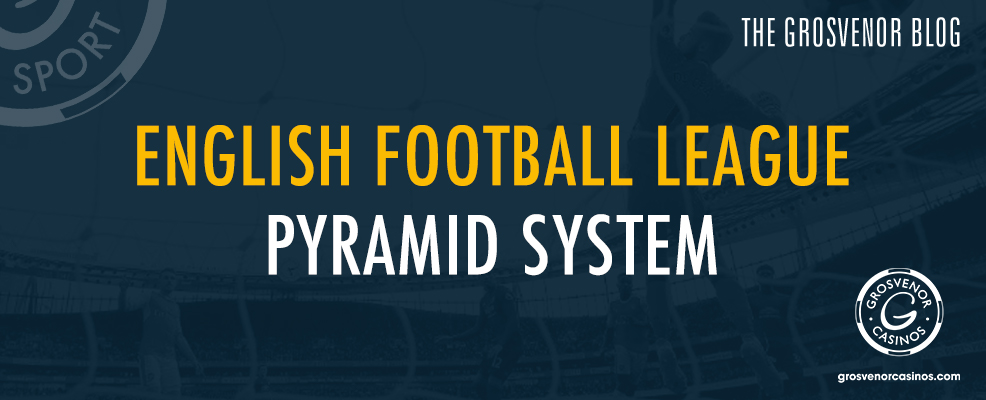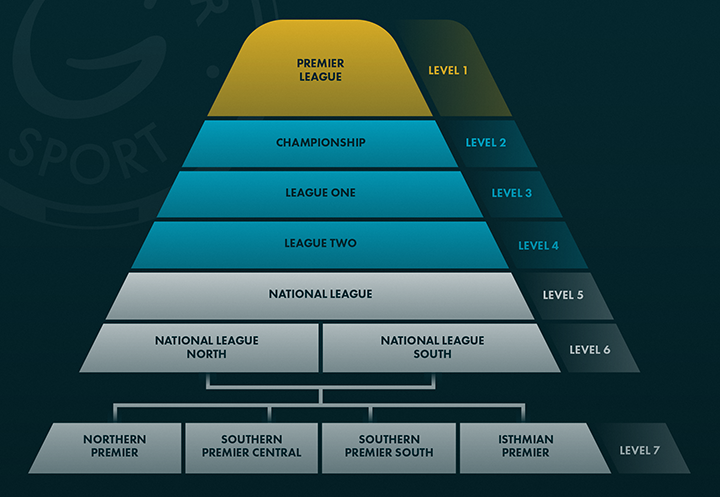The English Football League pyramid is one, if not the most-watched sport across the globe.
The series of interconnected leagues are run in a hierarchical system with promotion and relegation in place across every division. This promotion/relegation aspect is exactly the element that entertains the most.
With the performance on a constant improvement, it surely gives every side the incentive that one day they could potentially play in England’s top league – the Premier League.
Throughout this guide, we take an in-depth look at the system, the English cup competitions, and how the pyramid works.
Level 1: Premier League
No of Teams: 20
Teams
Manchester City, Manchester United, Leicester City, Chelsea, West Ham, Liverpool, Everton, Ashton Villa, Tottenham, Arsenal, Leeds United, Wolves, Southampton, Crystal Palace, Brighton, Burnley, Newcastle, Fulham, West Brom, Sheffield United.
The team that finishes top at the end of the season is crowned the Premier League champions, while the bottom three teams are relegated.
Interesting facts
- Since its inception in 1992, only seven teams have won the Premier League – Arsenal, Blackburn Rovers, Chelsea, Leicester City, Manchester United, Liverpool, and Man City. You can see a full list of Premier League Winners here.
- Only three teams have made it to the top of the Premier League table and been relegated in the same season – Hull City (2016/17), Bolton (2011/12), and Charlton (1998/99).
- Gareth Barry is the player with the most Premier League appearances (653) having represented four clubs (Aston Villa, Man City, Everton, West Bromwich Albion) in the top flight.
- Petr Cech (161) has kept the most clean sheets of any Premier League goalkeeper during his spells with Chelsea and Arsenal.
Did you know that you can bet on the action from the Premier Leagues at Grosvenor Casinos? Our Premier League betting page provides real-time betting options on your favourite teams for the league.
Level 2: English Football League Championship
No. of Teams: 24
Teams
Norwich City, Brentford, Swansea, Watford, Reading, Bournemouth, Cardiff City, Middlesbrough, Blackburn Rovers, Stroke City, Preston, Barnsley, Bristol City, Millwall, Luton Town, Nottm Forest, QPR, Huddersfield, Derby County, Coventry, Rotherham, Sheffield Wednesday, Birmingham, Wycombe.
The top two teams win promotion automatically, with the next four highest teams competing in play-offs with the winner gaining the third promotion spot. The final playoff match which decides who picks up the third promotion place is known as the richest fame in football. This is because of the extra money gained from playing in England’s top league. The bottom three teams are relegated. See the next match happening on our Football Betting page.
Interesting Facts
- Sheffield United’s Billy Sharp has scored the most goals in English league football this century (220), surpassing Rickie Lambert (219).
- The fastest sending off in British football is held by Sheffield Wednesday goalkeeper Kevin Pressman who was sent off after just 13 seconds for handling a shot outside the area from Wolverhampton’s Temuri Ketsbaia on the opening weekend of the 2001-02 season.
- Neil Warnock (10) holds the record for the Most Manager of the Month awards in the division.
Level 3: English Football League One
No of Teams: 24
Teams
Lincoln City, Hull City, Peterborough, Portsmouth, Doncaster, Sunderland, Oxford United, Charlton, Accrington Stanley, Plymouth Argyle, Crewe Alexandra, Ipswich Town, MK Dons, Gillingham, Fleetwood, Blackpool, Shrewsbury, Rochdale, AFC Wimbledon, Bristol Rovers, Swindon Town, Wigan Athletic, Northampton Town, Burton.
The top two teams win promotion automatically, with the next four highest teams competing in play-offs with the winner gaining the third promotion spot. The bottom four teams are relegated.
Level 4: English Football League Two
No of Teams: 24
Teams
Cambridge United, Forest Green, Cheltenham, Tranmere, Newport County, Morecambe, Exeter City, Carlisle, Salford City, Leyton Orient, Walsall, Crawley Town, Bolton, Mansfield Town, Oldham Athletic, Harrogate Town, Colchester, Port Value, Scunthorpe, Bradford City, Stevenage, Southend United, Barrow, Grimsby Town.
The top three teams win promotion automatically, with the next four highest teams competing in the playoffs with the winner gaining the fourth promotion spot. The bottom two teams are relegated.
Level 5: National League
No of Teams: 24
Teams
Torquay United, Sutton United, Hartlepool, Stockport, Notts County, Altrincham, Wrexham, Eastleigh, Boreham Wood, Maidenhead United, Bromley, Aldershot Town, FC Halifax Town, Solihull Moors, Chesterfield, Woking, Yeovil Town, Dag & Red, Wealdstone, Weymouth, King’s Lynn Town, Dover Athletic, Barnet.
The champions are promoted with the next six teams competing in the playoffs with the winner gaining the second promotion spot. The bottom four are relegated to either North or South division as appropriate.
Step 6: National League South and North
No. of Teams: 24
Teams
South
Dorking Wanderers, Dartford, Oxford City, St Albans, Eastbourne Borough, Hampton & Richmond, Hungerford Town, Ebbsfleet United, Havant and Waterlooville, Maidstone United, Hemel Hempstead, Dulwich Hamlet, Chelmsford, Billericay Town, Tonbridge Angels, Chippenham Town, Concord Rangers, Bath City, Braintree Town, Slough, Welling United.
North
Gloucester, Chester FC, AFC Flyde, Brackley Town, Kidderminster Harriers, Boston United, Chorley, York City, Leamington, Gateshead, Farsley, Spennymoor Town, AFC Telford United, Bradford P A, Hereford FC, Curzon Ashton, Southport, Kettering Town, Darlington, Guiseley, Alfreton Town, Blyth Spartans.
The champions are promoted with the next six teams competing in the playoffs with the winner gaining the second promotion spot. The bottom three are relegated to either Northern, Southern, or Isthmian Premier Division depending on their location.
Step 7 and below
We may have covered the top 160 teams in the English Football League pyramid, but there are still plenty more teams in the pyramid.
The next step below the National League South and North are the Northern Premier Division, Southern Football League Central Division, Southern Football League South Division, and Isthmian Premier Division.
Currently, there are 22 teams in each of those leagues with the champions automatically promoted, while the next four teams in each division compete in the play-offs. Those four winners are then paired off geographically for a further match to determine which two teams are promoted, teams. The bottom three teams from each division are relegated to an appropriate level, eight divisions.
Step eight follows a similar principle with seven leagues, where again the champions are promoted automatically and the next four teams in each division compete in the playoffs, with the five best play-off winners by points per game being promoted. The bottom two teams are relegated to a level nine division.
Cup Competitions
Members of leagues at a particular level make you eligible to compete in several Cup competitions
The major one is the FA Cup, where every team from Level 1-10 is eligible and it is this competition that gets the most exposure of any, with the potential for non-league sides (Level 5 to 10) to cause upset against the league sides (Levels 1 to 4). Take a look at our giantkillings blog here.
The EFL Cup is solely for the top-92 sides (Levels 1 to 4) to compete in, while the EFL Trophy is for teams from Levels 3 and 4, though it also includes several Academy sides from teams in Levels 1 and 2 to enable youngsters at those clubs to get senior game experience.
The FA Trophy is a non-league competition with teams from Levels 5 to 8 taking part, while the FA Vase is for teams from Levels 9 to 11.
Want to learn how to bet on all the football in the English Football League Pyramid? Our handy blog explains all you need to know.
Finding your football betting skills as reliable as Man Utd since Fergie left? Why not take a break and check out what else you can bet on at Grosvenor Casinos at our sports betting site.


Leave a Reply